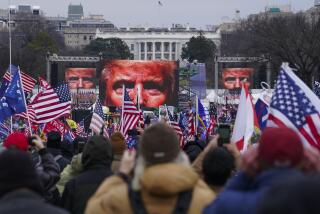Panel changes rules to let Musharraf stay army chief
- Share via
ISLAMABAD, PAKISTAN — In a controversial step, election officials Monday announced a rule change under which President Pervez Musharraf would be allowed to stand for reelection while still serving as head of Pakistan’s military.
At the same time, though, the Supreme Court began hearing legal challenges to Musharraf’s plan to remain army chief as he seeks reelection by lawmakers as head of state early next month.
Further complicating matters, a senior advisor to the beleaguered Pakistani leader floated what appeared to be a compromise offer to political foes, saying it was expected that Musharraf would relinquish his military post after being reelected president but before being inaugurated.
“Inshallah [God willing], Gen. Musharraf would take his oath of office as a civilian president,” his party’s secretary-general, Mushahid Hussain Sayed, told reporters.
Musharraf’s refusal thus far to give up the military uniform he has likened to a “second skin” has hampered power-sharing talks with exiled former Prime Minister Benazir Bhutto and galvanized a pro-democracy movement that in recent months has forcefully demanded a return to civilian rule.
The general, who seized power in a 1999 coup and has since become a close ally of the United States, is fighting off an increasingly bold Islamist insurgency even as he struggles with plummeting popularity.
The Bush administration is worried that his toppling could bring about a power vacuum that would give Islamist militants greater sway, and perhaps even endanger the security of Pakistan’s nuclear arsenal. Musharraf’s opponents say most Pakistanis support centrist parties that are capable of maintaining security and stability.
Election-related rulings by the newly activist high court, expected in the next week, are likely to prove the pivotal factor in Pakistan’s tense political standoff.
A decree by the Supreme Court that Musharraf is ineligible to stand for reelection, for any one of a number of legal reasons being presented by opponents, would override Monday’s declaration by the Election Commission.
But such a verdict could also provoke Musharraf to declare emergency rule or martial law. Either move would give him broad power to muzzle opposition and put off parliamentary elections, which are to be held by early next year.
The Musharraf opponents who descended on the high court Monday to press their cause came from across the political spectrum: Islamists, a lawyers group, and backers of activist and former cricket star Imran Khan. On the manicured grounds of the court complex, knots of competing protesters shouted out the same demand: that Musharraf go.
Opposition parties have threatened to resign from provincial and national assemblies before the presidential balloting, which is expected during the first week of October. Musharraf’s party says it has enough votes in parliament to secure victory without them, but mass resignations would tarnish the ballot’s already dubious legality.
In the various court cases, opponents are arguing that lame-duck legislators should not be given the task of reelecting the president; that it is unconstitutional for Musharraf to be elected while serving as army chief; and that even if he gave up his military role now, the constitution dictates a two-year waiting period between holding such a government appointment and seeking public office.
Last week, Musharraf refused to allow an exiled political rival, former Prime Minister Nawaz Sharif, into the country, deporting him within hours of his arrival. Bhutto, who has a wide following, has announced her intention to return Oct. 18, even though she could face prosecution on still-active corruption charges.
Musharraf’s aides denied that the general had pressured the Election Commission to change the eligibility rules in his favor. The commission itself said the rule change reflected court rulings over the last several years.
But the popular animosity toward military rule in general and Musharraf in particular has alarmed his top lieutenants. Bhutto, among others, has demanded that he give up his military position without further delay.
--
More to Read
Sign up for Essential California
The most important California stories and recommendations in your inbox every morning.
You may occasionally receive promotional content from the Los Angeles Times.













